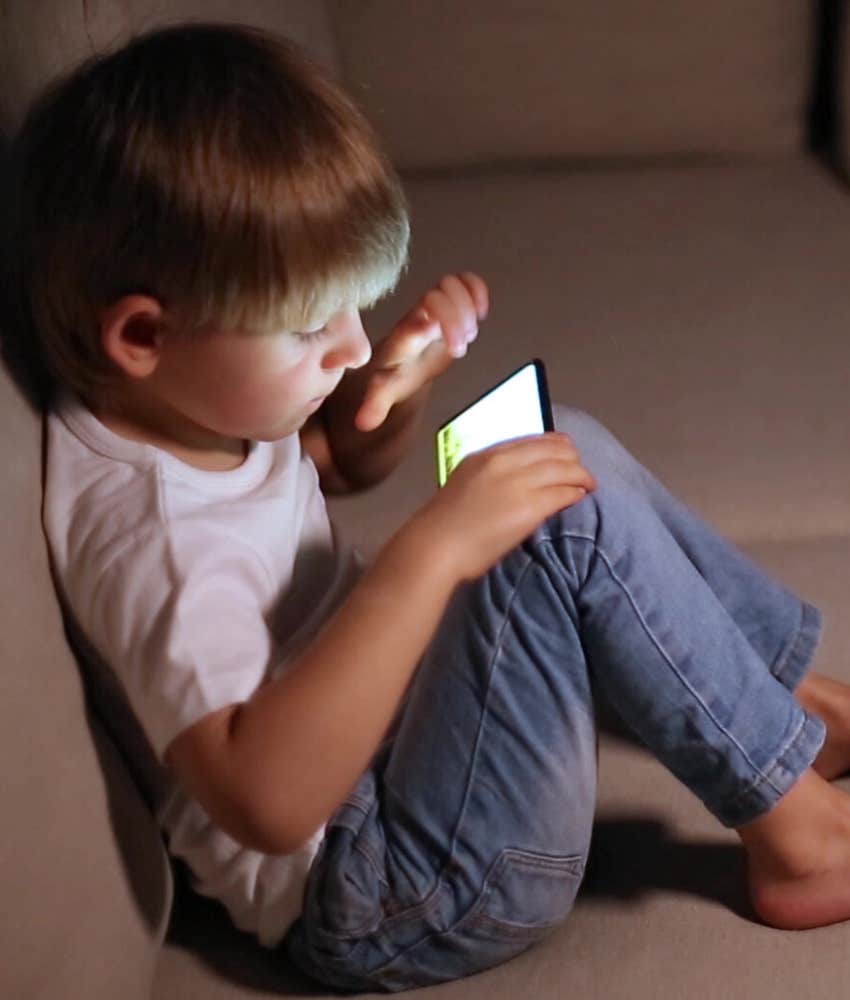3 Things That Come Easier To Kids With Limited Screen Time & Benefit Them Their Whole Lives
Parents say limiting screen time for kids helps everything from their sleep to their behavior and creativity.
 Oksana Kuzmina | Shutterstock
Oksana Kuzmina | Shutterstock Screen time is one of the great parenting debates nowadays, as more and more research shows that it may be doing kids more harm than good. But placing limits on screen time is often no small feat — anyone who has or has spent time with an iPad kid knows tantrums often ensue, especially given that all of our devices are literally designed to be addictive.
Recently, some parents shared that limiting screen time for kids can reap major benefits — ones they say make it worth the trouble to deal with all the fits of rage and complaints that might ensue.
Here are 3 benefits of limited screen time for kids, according to parents who've done it:
The discussion began after a mom-to-be posted in the r/parenting subreddit looking for input on this issue. "I’m keen to hear your experience with your kids and screen time," she wrote in her post. "I’m about to become a new Mum and I just find this topic so interesting."
 oleksandranaumenko | Canva Pro
oleksandranaumenko | Canva Pro
She went on to say that she and her husband are both hoping to place limits on screen time, but "the amount of people who tell us ‘just you wait’ is kind of astounding," she wrote in reference to the number of parents who say limiting screen time is easier said than done.
Parents had lots of advice for her, including the many benefits they've noticed in their kids after placing boundaries around screen time or in comparison to friends' kids who are given free rein.
1. Fewer tantrums and behavioral issues
This is in line with expert recommendations and research on the topic. A Canadian study found a direct link between screen time and tantrums. In the study, they found that increasing each child in the study's screen time by an hour each day correlated with a major increase in anger, frustration, and tantrum behavior a year later.
This is in line with the large body of research saying that screen time negatively impacts kids' emotional regulation skills, especially when parents use screen time as a comforting mechanism during high emotions.
2. More creativity and independence
Research has shown this to be true as well. Creative activities that don't involve screens trigger kids' communication and motor skills in ways that screens can't, which is integral to their development and has been shown to have a long-term impact, including once they start school.
As for independent play, many parents noticed their kids were better able to entertain themselves for longer stretches, though experts say getting your kids to engage in independent play may take a bit of practice.
Progressively introducing them to longer stretches of play without your — or a screen's — intervention can help them build up those skills for independence.
3. Easier bedtimes
This one is a bit of a no-brainer, because screens are widely known to disrupt sleep processes in all of us, not just kids. This is because the light from screens is in the blue area of the color spectrum just like daylight, so that glow mimics daylight to our brains.
This impacts every aspect of the sleep-wake cycle, including suppressing hormones like melatonin that tell us it's time to sleep. Crucially, kids don't have the know-how and willpower yet to do what even many of us adults struggle to do — force ourselves to put the phone down and go to bed!
A teacher also recommended not going to either extreme when it comes to screen time.
Perhaps the best advice offered, though, was not to swing the pendulum too far in either direction. A teacher on Reddit wrote of having noticed that students whose parents placed heavy restrictions on screen time seemed to be obsessed with it — sort of like being told you can't have a cookie just makes you want the cookie all the more.
By contrast, those who didn't limit it at all had kids who "struggle to communicate with peers and have no creativity."
So, for her own kids, she decided to take the middle ground and adopt the maxim that "screen time is morally neutral," with one simple rule: "Sometimes you can watch a screen, sometimes you can't, but it's up to me."
For her kids, that means sometimes they watch screens for an entire Saturday afternoon and other days not at all — but they don't have the obsession with screens that a lot of kids have, and it's mostly not a problem to manage their use.
Regardless of what approach you take, nearly all parents agreed — pushback in the form of tantrums is pretty much part of the game. They agreed that parents have to just push through it until kids adjust and the benefits can begin outweighing the challenges.
John Sundholm is a writer, editor, and video personality with 20 years of experience in media and entertainment. He covers culture, mental health, and human interest topics.

